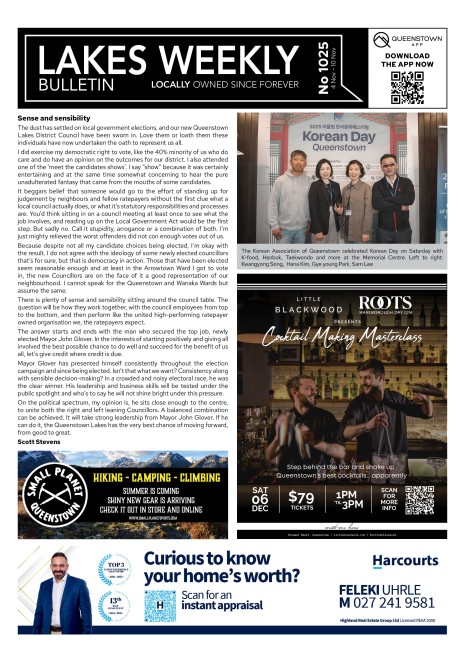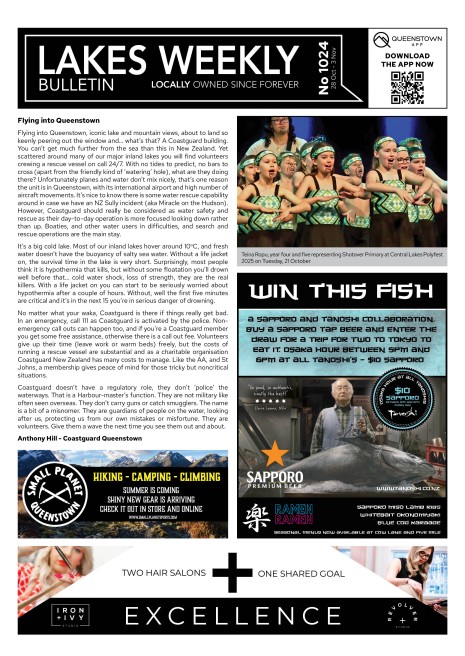Ski season crackdown on workers’ rights - Employers must comply

The Ministry of Business Innovation & Employment staff will keeping a sharp eye on employers and landlords in the Queenstown Lakes District this ski season to ensure workers are being treated fairly and within the law, with a large influx of temporary migrant visa workers anticipated.
An MBIE spokesperson says this is only the second ski season when the borders have been fully open during New Zealand’s post-Covid recovery and the first where near pre-Covid travel has been restored. “With this in mind, MBIE has set out to remind employers of their responsibilities to potentially vulnerable workers as the ski season nears.”
MBIE’s Immigration Compliance, Labour Inspectorate, and Building & Tenancy bosses have taken the unusual step of warning employees to be aware of their rights and warning employers that they need to be aware of the rules as breaches will not be tolerated.
The Labour Inspectorate will be “active in the Queenstown Lakes area this ski season with multiple employer site visits and stakeholder engagements”, he says. “Where there are clear and cynical breaches of employment laws by employers, the Labour Inspectorate will use all available enforcement measures, including infringements, Enforceable Undertakings, Improvement Notices and prosecutions, if applicable.” However, if breaches are minimal and unintentional the Inspectorate would work with employers and employees to educate or resolve any complaints.
He says Immigration Compliance visits Queenstown regularly engaging with employers and individuals. A graduated response is taken, ranging from education to infringements, and for individuals may include issuing deportation liability notices.
He was unable to comment on the “specifics” of any local investigations and compliance action.
Further changes to the Accredited Employer Work Visa came into effect last month (April) and may affect Queenstown Lakes ski, tourism, and hospitality sectors, he says. “It’s important that employers and employees are aware of these.”
Employees need to know their rights so they can report non-compliance with minimum employment standards and any other issues related to the terms of their employment.
Last year 160 ski employees were granted AEWV to fill skifield roles. The hospitality industry also requires skilled workers, including chefs and restaurant managers, who may be eligible for an AEWV. No numbers were available on how many AEWVs are likely to be issued for this season.
Stephanie Greathead, MBIE’s national manager, Immigration Compliance, says regardless of the visa type, the onus is on the employer to ensure they know their employees are lawfully able to work in NZ. “They’ll need to sight their passports and cross check them to ensure they can legally work here.” Visa conditions must be met.
She warns that it’s illegal for employers to request a fee from a visa holder to secure a job or to demand to keep their passport and migrant workers need to be aware of their rights.
Teams from Immigration Compliance and the Labour Inspectorate regularly monitor levels of compliance in the Queenstown area.
Where possible a “graduated approach” is taken to compliance with minimum employment standards, providing education and guidance to help employers remain compliant, prevent breaches and harm.
David Milne, the Labour Inspectorate’s northern regional manager, says employers need to understand that no matter whether the employees are employed on a casual, part-time or fixed-term basis they all have minimum employment rights.
“This includes providing all workers with a written employment agreement, paying them at least the minimum wage if they are 16 years or older, allowing them meal and rest breaks, paying them for holidays, sick leave and for working on a public holiday.”
Mr Milne says it’s important that accurate records are kept of an employee’s time worked, payments, holidays and leave taken and entitlements.
People planning to stay for the full season may prefer fixed-term rental accommodation rather than staying short term in hostels or backpackers. “Employers need to be aware that they can only make deductions for board and lodging if both parties agree to it, while there are also other terms of such an arrangement that need to be formalised,” Milne says.
Brett Wilson, national manager, Tenancy Compliance and Investigations Team, says, it’s important that employees understand their rights, and the landlord’s obligations when they look for accommodation, even just for a few weeks or months.
“This will avoid potentially vulnerable employees being short changed or staying in accommodation that does not meet the required standards,” he says.
Employers who provide staff accommodation must adhere to service tenancy requirements to comply with tenancy law and Healthy Homes Standards. Smoke detectors are compulsory.
Fact box:
DON’Ts for Employers:
- deduct money without the employee’s permission
- ask them to pay a premium for hiring them, or prior to hiring them
- demanding to keep their passport
- make the employee do a 90-day trial period unless this has been agreed to in the employment agreement prior to starting work, or the trial period is invalid
- ask an employee to deviate from their visa conditions or work while they don’t have a valid visa.









